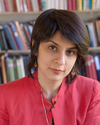World Art Studies and Global Art Histories
- Winter 2019
Meeting Time:
Th 3:30pm - 6:20pm
Location:
ART 312
SLN:
10518
Joint Sections:
HUM 596 D
Instructor:
Catalog Description:
Specific focus changes from quarter to quarter.
Credits:
5.0
Status:
Active
Last updated:
August 2, 2019 - 9:11pm



